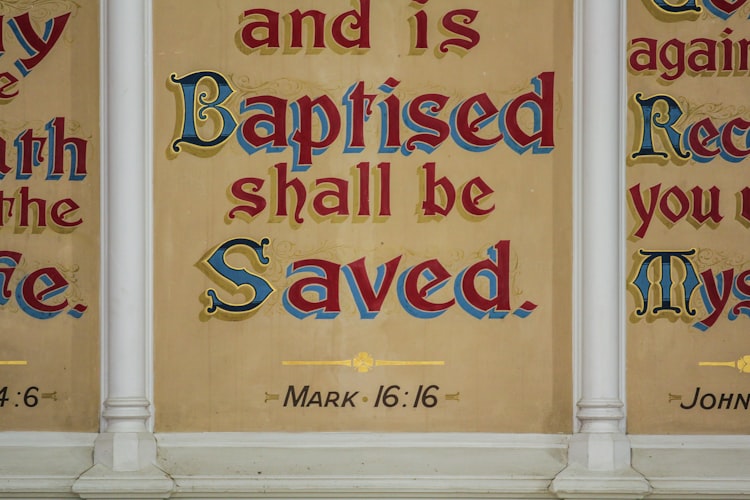Don't Read the Bible Alone
Reading Scripture is a uniquely bizarre thing that Christians do. It is the rare person who, in any other circumstance, would pick up a piece of 2,000+ year-old literature and try to apply it to their life today. You might have had to read The Republic in college. Perhaps some sections of Gilgamesh in world literature. But I doubt your teacher had you attempt to figure out, "What does this say about God? How can you live out these principles today?"
When we approach the Bible, we are apparently supposed to come at it with those sorts of questions. But coming away with any kind of confidence on how to answer those questions can be not all that dissimilar from trying to read Shakespeare for life application points. The language is confusing; the jokes go over our heads; and what does any of this have to do with my life anyway?
The advice I usually give folks about reading Scripture comes in three parts: 1) Don't read the Bible alone. 2) Don't read the Bible alone. 3) Don't read the Bible alone. Here's what I mean.
1. Don't read the Bible without other people.
In evangelical churches, we often talk about having a "quiet time" or doing devotions. We do this by ourselves, alone with Jesus, in solitude. We read our Scripture, maybe make some notes, perhaps jot down some questions, and then...move on with our day.
This approach is fine, but it creates problems if it's all we ever do. Our questions stay just our questions. We are not held accountable for any sort of response to God's Word. And if we happen to concoct a bizarre belief on our own, there's no one around to challenge us. "Are you sure that's what Scripture is saying?"
Taking in God's Word was never meant to be an individualistic enterprise. Do a word study on "assembly" in the Psalms, and you will see all the things that believers are told to do together with other believers. Declare God's name and praise Him. Proclaim God's saving acts. Recount His word to others. The Scripture was written in community and is best read in community.
2. Don't read the Bible without the big-C Church.
I was once part of a Bible study that was one of the most toxic places I had ever encountered. The people often got into nasty fights, insulting each other. Grossly inaccurate teachings about God and Scripture were tossed around like they were normal. Though I knew something was wrong, it was hard to look away because of how much of a train wreck it was. But then it all made sense when one day, the leader proudly proclaimed, "I will never read any book other than the Bible."
Ah.
There can be a particular strain of spiritual pride that states, "Because I don't want to be corrupted by 'man's wisdom' or 'human philosophy,' I will not read anything other than the Bible. That way, I can have the most pure beliefs out of anyone." This person will say that all commentaries, biblical studies books, or even other sermons are all worthless pursuits of "false knowledge."
As St. Paul would say, "Such regulations indeed have an appearance of wisdom, but they lack any value." In fact, it's one of the stupidest decisions a Christian could make. Instead of submitting themselves to the collective wisdom of 2,000 years of Christian teaching, writing, preaching, and experience, this person has decided to strike out on their own, rejecting everything the Church has to offer.
Even if that's not you—i.e., you do recognize the value of other teachers' and scholars' lessons about Scripture—I have to ask you how often you actually utilize them. And I'm not just talking about a devotional thought from Daily Bread or your favorite Christian blogger. Are you using the best available writings and research on the biblical text? Are you checking your thoughts and suppositions against them?
If you feel lost on where even to begin, I'll be suggesting some of the best resources available today in a future post.
3. Don't read the Bible without the Holy Spirit.
Finally, when we read Scripture alone, we must read it in the presence of the Holy Spirit. The Holy Spirit is the one who makes it possible to even understand the Gospel or the Words of Scripture. John 16:13 says it is the Spirit that guides us into all truth. She will illuminate God's Word so it makes sense and is intelligible to us. That's why any encounter with Scripture best begins with a prayer, "Spirit, open my eyes to see, unblock my ears to hear, warm my heart to receive, unlock my mind to understand, enliven my body to respond."
While the Spirit's illumination can come through us sensing a voice speaking to us, perhaps the conviction of our conscience, or maybe sudden "a-ha" moments as we read, the Spirit works in other ways too. Namely, the Spirit will use people in our community and the collective wisdom of the Church to guide us as well. And for that, you need to re-read points 1 and 2!
So, when I say, "Don't read the Bible alone, don't read the Bible alone, don't read the Bible alone," that's what I mean. Our continued journey into faith and knowledge of God's Word is best done when we embark with others. I pray that as you make this journey, you find it the best you could ever hope for.





Member discussion